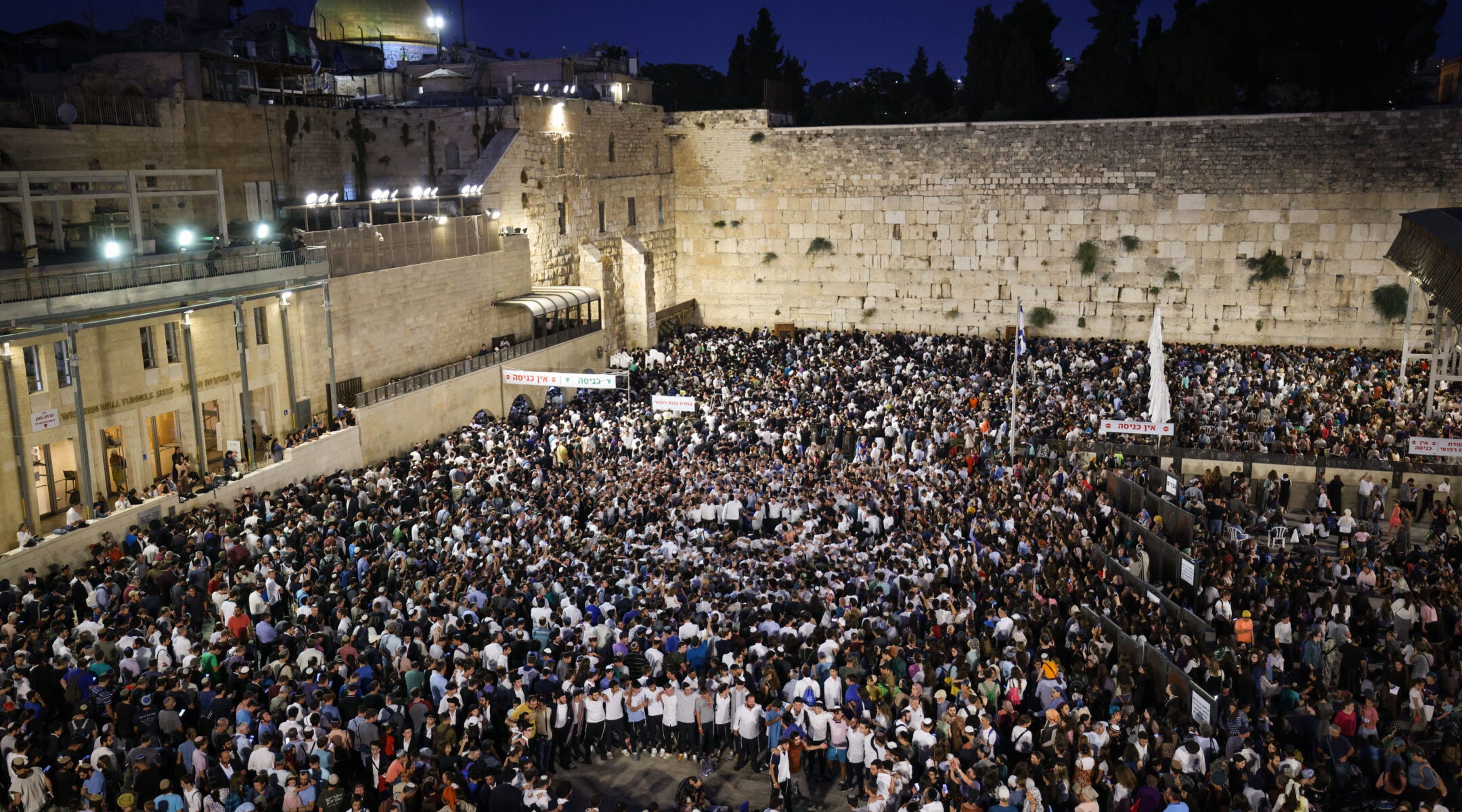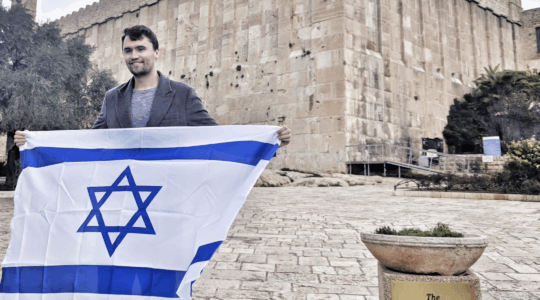Two days before Tisha B’Av, the Israeli scholar Tomer Persico warned that the country was facing another destruction of Jerusalem, this time of its “moral and religious core” brought on by Israel’s conduct in Gaza.
Citing the verse from Lamentations, “Look, Lord, and see, children starve in the streets,” he pointed to the images of emaciated children now circulating the globe.
“Our country has become one of a cruel minority committing crimes against humanity,” he told a live Zoom audience gathered for what was framed as a national soul-searching ahead of the fast day.
“Yes, Hamas should have surrendered long ago. Yes, they steal aid. Yes, they manipulate the media. But in the end, it doesn’t matter. We could have flooded Gaza with humanitarian supplies. We didn’t,” he added.
Other commentators used Tisha B’Av to make the opposite claim. Yedidya Meir, a columnist for the right-wing Channel 14, compared accusations of deliberate starvation in Gaza to a modern blood libel and mocked Israel’s attempts to respond. He pointed to the Foreign Ministry’s statement on Sunday denying the charge and calling out Hamas for distributing images of children with terminal illnesses for propaganda purposes while simultaneously announcing daily tactical pauses in the fighting and airdrops of food.
“Do you understand? I really don’t,” he wrote, likening the government’s mixed messaging to the logic of a medieval blood libel: “We do not use the blood of Christian children to bake matzah. This is vile slander. But to refute the false claim, we decided to shut down the matzah bakeries during the hours that Christian children finish their studies.”
Meir, who is haredi, pointed to the haredi draft exemption as the latest flashpoint in the national rift and questioned the sincerity of Tisha B’Av unity events. “Why is it then that this year, on the eve of Tisha B’Av, there are no fancy ads inviting people to evenings of dialogue and reconciliation with the ultra-Orthodox?”
Meir also quoted a viral Facebook post by Leah Zakh Aharoni, a religious mother of a soldier, who wrote that she could “physically no longer take the debate over the draft.” Referring to scenes of Jews clashing at recent protests, she wrote, “I’m scared for us. For our people. For what we’re doing to each other,” warning that the Jewish people had survived everything in its history, except turning on each other. Ahead of Tisha B’Av, she said, Jews were fighting over “who carries the truth.”
“You can’t scream ‘Torah protects us’ and ignore the mothers of soldiers sitting up all night in fear. And you can’t scream ‘share the burden’ and spit on people who’ve never missed a Shacharit since age five,” she wrote, referring to the morning prayer. “Ahavat Yisrael [love of Israel] isn’t a bumper sticker. It’s a lifeline. And every word of hatred is a bullet in our enemies’ weapons.”
Elazar Symon, a rabbi at the liberal Orthodox Hadar Institute in Jerusalem, also took to Facebook to share a flyer he found in his mailbox advertising a far-right march set for the night of Tisha B’Av under the slogan “Not with weeping, with roaring.”
The event, organized by Temple Mount activists and backed by several far-right Knesset members, promised a “flag parade” around Jerusalem’s Old City walls. According to Symon, replacing mourning with the “secular language of sovereignty” and nationalism was a desecration of Tisha B’Av and of the Temple itself.
“Choosing sovereignty over weeping for the Temple and praying for its rebuilding is a choice of death,” he wrote, and went on to cite German theologian Franz Rosenzweig, who warned that when a nation “loves its land more than the essence of its life,” that love will eventually destroy it.
Speaking to the Jewish Telegraphic Agency, Symon said, “I may have come off as a bit militant, and I’m not trying to attack anyone, certainly not any one group,” but said he was shocked that less than two years after Hamas’ Oct. 7 attack, with hostages still in Gaza tunnels, anyone could suggest that even on Tisha B’Av crying wasn’t appropriate. He also noted the parade would likely mean another night of lockdown for Arab residents of the Old City.
“The next time one of these figures calls concern for the hungry in Gaza a progressive distortion, or says prioritizing the hostages is defeatist, remember they also think weeping on Tisha B’Av is a mistake,” he wrote in his post.
His one consolation was the thought that the messianist movement would not endure and would one day be “an embarrassing historical memory, because anyone who doesn’t know how to cry on Tisha B’Av is giving up eternal life.”
A stone’s throw away from the march around the Old City walls, a separate Tisha B’Av gathering will be held at Zion Square, commemorating 10 years since the murder of Shira Banki, who was stabbed at the 2015 Jerusalem Pride Parade — an event that became a symbol of baseless hatred in the capital. The gathering will include a public reading of Lamentations, musical interludes, and panel discussions on topics ranging from the judicial overhaul to the draft and the rule of law. Among the participants is Shir Siegel, daughter of former hostage Keith Siegel, an American-Israeli released during a ceasefire in February.
Siegel, 29, also spoke on Thursday evening’s Zoom and said she never imagined she would become so involved in religious conversations. Coming from a secular family, she admitted she had known little about Tisha B’Av but said that in the hardest moments during her father’s captivity, it was the sense of national unity that gave her and her family strength.
She added that before Oct. 7, she hadn’t felt deeply connected to the country, and that many in her generation felt the same. But now, she called on others to step up, especially in the political sphere. “When people ask me when I’m going into politics, I always turn the question back on them. When are you? My request is that we all feel more connected to this country. We’re all equal. Politics is not a bad word.”
She ended with the hope that Israel would find its way out of darkness and into light, and pointed to her own wedding as a kind of marker. She had been engaged before Oct. 7, but the abduction of her parents and the year and a half that followed put everything on hold. Now, with the wedding set for Thursday, she said, “I hope my wedding gives people hope that it can be good.”
In Tel Aviv’s Hostage Square, a Tisha B’Av gathering will be held on Saturday night immediately after the weekly rally with a public reading of Lamentations, followed by dialogue circles with the families of the hostages. The event’s organizer, Anat Sharbat, invited Israelis of all streams to join the event, telling JTA that the Second Temple was destroyed not because of hatred in the way people often imagine, but because of the notion that everyone must think the same.
“Baseless hatred is not just hatred,” she said. “It is the inability to tolerate another opinion. Unconditional love is the opposite — understanding that we are different, and that this does not come at the expense of unity. On the contrary, it’s precisely this diversity that builds a healthy, living society. If we can understand that, maybe we really can start to rebuild.”
JTA has documented Jewish history in real-time for over a century. Keep our journalism strong by joining us in supporting independent, award-winning reporting.






